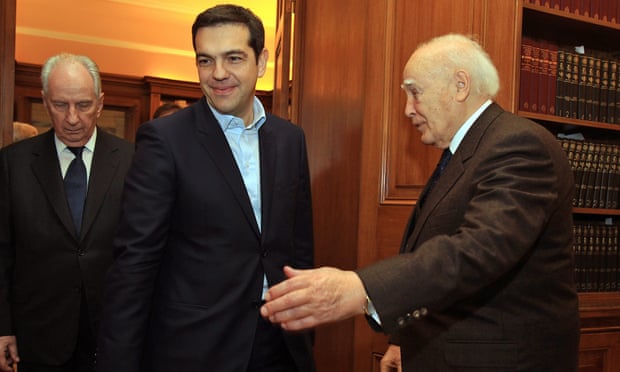What a
difference eight months can make. When Syriza came to power in Greece in
January it did so on a wave of voter enthusiasm. There was talk of an austerity
party breaking the mould of post “great recession” politics. Europe’s political
establishment looked on in horror. The financial markets trembled.
In reality, there is no reason for the
markets to worry about Greece, at least for now. Tsipras quickly discovered
once he had swept to victory in January that he could not deliver on a mutually
incompatible trio of election pledges: to end austerity, to put the economy on
the road to recovery and to stay in the euro. He has achieved just one of these
objectives - remaining in the euro - but at a high price.
The fresh dose of deflationary measures in
Greece’s new €86bn (£62bn) bailout programme, agreed in July after Tsipras
folded under pressure from creditors, will deepen a depression similar in its
severity to those that afflicted Germany and the United States in the 1930s.
The Greek economy has contracted by 29% since 2009 and is still shrinking after
months of financial turmoil. Yet Greece remains part of a single currency that
has emerged bloodied but intact. All the main parties contending the election
were committed to continuing with the bailout that Tsipras negotiated in the
summer.
Even so, the election will have
consequences. Syriza has done well enough to form a workable coalition, thereby
avoiding the need for another election and removing one of the hurdles before
Greece has the first review of its bailout some time before the end of the
year.
Tsipras is confident that a successful
review will mean European money is handed over to recapitalise the fragile
Greek banking system, enable the European Central Bank (ECB) to buy Greek bonds
as part of its quantitative easing programme and pave the way for debt relief.
The International Monetary Fund says Greece is
unlikely to make a full economic recovery without a significant reduction in
its debt burden and has said it will not contribute to the €86bn support
package unless Europe offers Athens more generous terms.
Tsipras will step up the pressure for debt relief
now that he has his new mandate, and hopes that Greece can at last start to
regain some of the ground lost in the past six years. He will argue that less
onerous austerity measures would speed this process, a line that is likely to
find little support at the European Commission, the ECB or in Germany.
The ratings agency S&P is still
concerned about Greece’s economic prospects, noting that it remained to be seen
whether Greece could emulate Ireland, Portugal and Spain in attracting
investment from abroad.
The S&P
report said debt relief was one way to put the “spectre” of Greece defaulting
on its debts to rest, but added that this would be a difficult and potentially
politically costly decision for European governments to make.
“One thing seems certain to us. Without
greater confidence in a future for Greece within a currency union, co-existing
with enough pro-growth policies to support better employment opportunities, the
odds of failure remain as real as the possibility of success,” said Frank Gill,
Standard & Poor’s credit analyst.
The danger is that the austerity conditions
remain fully in force and debt relief is much less generous than Tsipras is
hoping for. It will require an improbably strong and rapid recovery for Greece
to meet the optimistic growth and deficit reduction targets contained in its
current bailout deal. As a result, the likelihood is that they will be missed,
leading to pressure for further budget cuts.
What does that mean? It means that Greece
will be back in the headlines for all the wrong reasons before too long. There
will be talk of the need for a fourth bailout and of possible default if Greece
doesn’t get one. The election is over; the economic crisis is not.
Πηγή:
theguardian.com




Δεν υπάρχουν σχόλια:
Δημοσίευση σχολίου